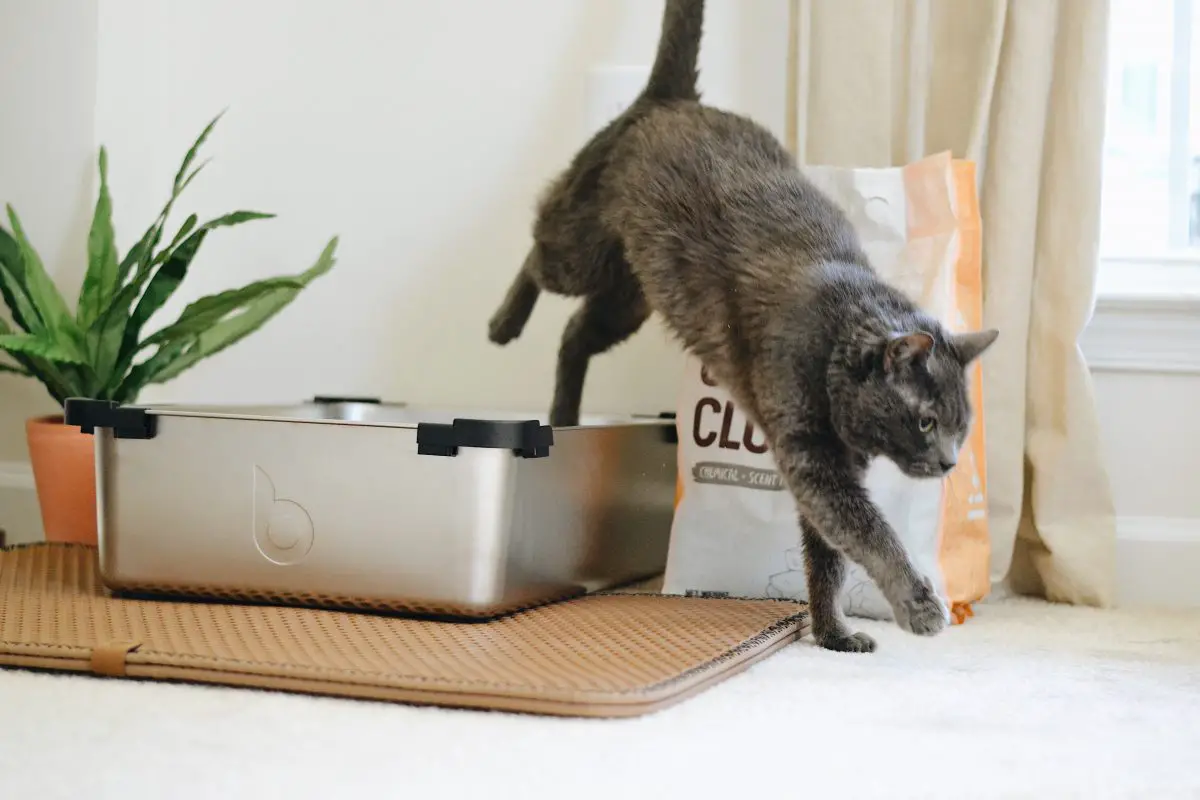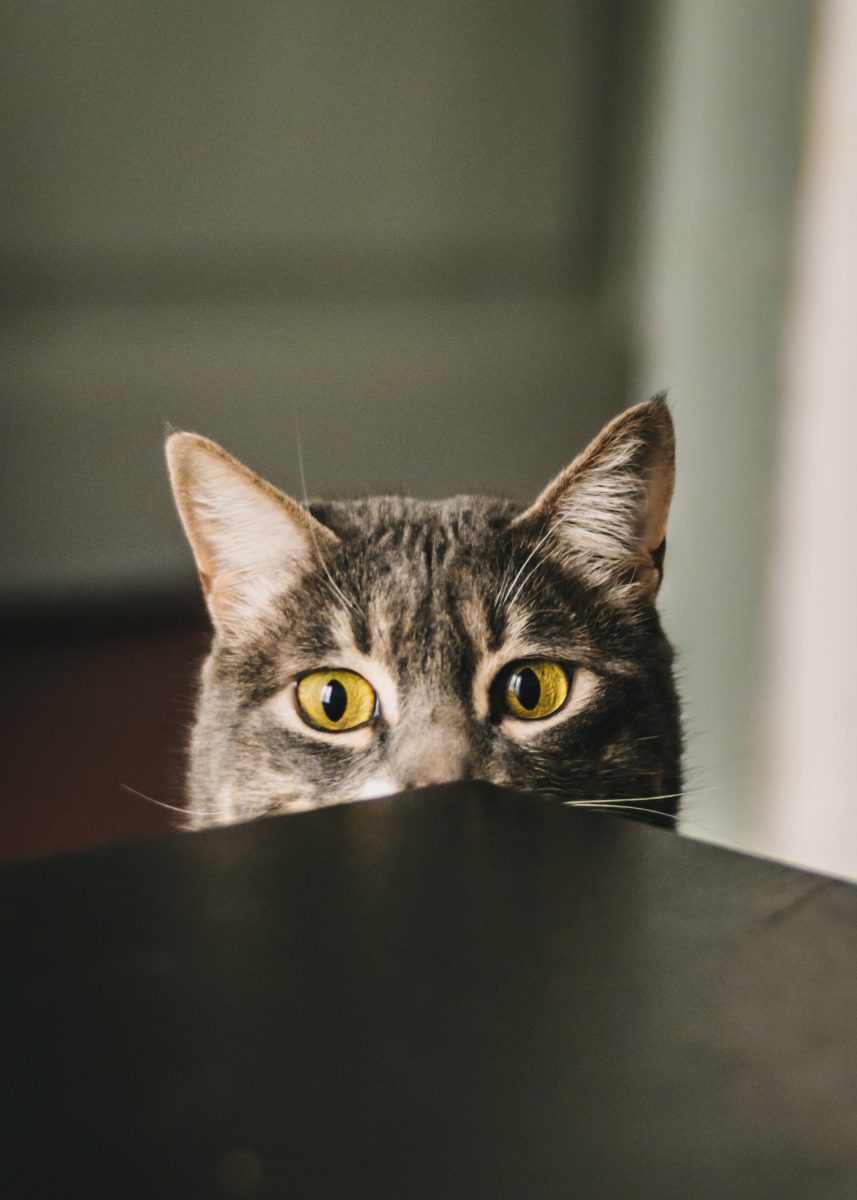As a cat owner, you know cats are fastidious cleaners who enjoy neatness. So why is my cat peeing everywhere all of a sudden, you ask? Urinary issues, both medical and behavioral, are very common among cats. Unfortunately, while most of the issues can be solved, most people end up rehoming their cats before they try. If you’re here, it means you’re seeking an answer, so let’s not keep you waiting!
If your cat or kitten is peeing outside of the litter box, there is a reason for it.

Table of Contents
- Why is My Cat Peeing Everywhere All of a Sudden?
- Behavioral Reasons For a Cat Peeing Everywhere
- Medical Reasons For Cats Peeing Outside of Litter Box
- How Do I Get My Cat to Stop Peeing Everywhere?
- Why Is My Cat Peeing Everywhere All of a Sudden: No More Puddles!
- FAQs
Why is My Cat Peeing Everywhere All of a Sudden?
Although finding or smelling cat pee everywhere in your home might feel like an act of war. However, you must remember that your cat’s actions are not something done intentionally or out of aggression. Punishing your cat for peeing outside of the litter box isn’t going to solve any issues. In fact, such measures often make matters worse. Cats do not respond to negative reinforcement and punishments.
If your cat is peeing everywhere suddenly but used the litter box before, it’s often a medical condition or a behavioral issue. Let’s explore both possibilities, so you can figure out the best course of action.
Behavioral Reasons For a Cat Peeing Everywhere
Cats will often act out of turn when something is amiss in the home. Being that cats are creatures of habit, one alteration to the daily routine can noticeably change the way they behave.
A few behavioral reasons that lead to a cat or kitten peeing outside of the litter box include:
- Dislike of the litter box.
- Unclean litter box
- Sudden life changes and disruptions
- Surgery (such as recovering from being declawed)
- Not spayed or neutered
- Litter type preference
- Jealousy
- Anxiety
Here are some further details:
Changes and Disruptions in the Home
Take a moment to consider any recent events. Have you renovated your home or started a major project? Did you host several parties or have family members come to visit for a few days? While these might be exciting and joyous for you, your cat feels nothing but upheaval.
It’s sheer chaos when the litter box is moved, too. Your cat might feel stressed and want to pee where they usually do. If something changes that up, or if they are too anxious, it could lead to peeing everywhere but the litter box.
Changes in Litter Type or Box
Have you recently swapped in a different kind of litter? Did you purchase a new litter box? Is your cat too large for the box? Whenever you make a change that doesn’t suit your cat’s preferences, there is a risk they will find somewhere more comfortable to do their business.
It’s important that you find a style of box that is appropriate for your cat. Large or long-haired cats might dislike a covered, enclosed litter box, because it feels claustrophobic. Some cats may struggle with larger granules and need a softer litter.
Dirty Litter Box
Cats don’t want to toilet somewhere gross. Sometimes, if the box hasn’t been cleaned for a while, they’re not going to use it. Make sure you are routinely cleaning out the box, especially if multiple cats are using it. Don’t forget to pour in fresh litter once in a while and wipe out the box with a disinfectant.
Jealousy
Interestingly, cats can experience a broad range of emotions. This means that they might be using poor behavior to get your attention. Jealousy occurs whenever you bring home a new pet or baby, since your attention shifts from your cat to other things.
Giving your cat some love may absolve their peeing issues, but a veterinarian may be able to prescribe medication if it’s jealousy and anxiety combined.
Stress & Anxiety
Despite looking calm and carefree on most days, cats can also be extremely anxious creatures. An anxious cat is also one that acts up by spraying their territory and peeing around the house. You might also notice other symptoms of stress in cats, such as:
- Over-shedding
- Changes in appetite
- Diarrhea
- Vomiting
- Obsessive grooming to the point of raw or balding spots
- Increased vocalizations
- Aggression
- Hiding or seeking solitude when usually friendly
- Tense body and dilated pupils
You should also look at the cat tail signs that your feline friend is always broadcasting. A low hanging tail or tucked tail is often a sign of anxiety or fear.
Do you suspect that the litter box issue is due to stress or anxiety? It’s best to talk with a veterinarian. They may prescribe some calming medication. Other methods include pheromone diffusers and sprays.
Not Spayed or Neutered
Why is my female cat peeing everywhere all of sudden, you wonder? Well, is she spayed? Cats can be territorial, especially when they were once alone in the house. When you introduce a new cat or kitten, you’re upsetting your other cat’s territory; that will upset them, and they might start spraying the things that they consider theirs. While this might happen even after a cat has been neutered or spayed, it’s more common when they haven’t been altered.
This video provides some excellent pointers for dealing with spraying cats:
Keep in mind that spraying and urinating are two different things. If your cat is spraying, it’s going to smell worse. Usually, the best way to stop your cat from urine marking around the house is to get them spayed or neutered.
Medical Reasons For Cats Peeing Outside of Litter Box
Many cat owners mistake a cat peeing everywhere in the house as a behavioral issue instead of a medical condition. For that reason, many cats go untreated for a long time. It’s recommended that you take your feline friend to the veterinarian as soon as they start peeing outside of the litter box to rule out medical problems. Otherwise, the issues could worsen and cause your companion a lot of pain and discomfort.
Here are some medical issues that make cats pee outside of the litter box:
- Diabetes
- Bladder stones
- Urine crystals
- Feline urinary tract infection
- Hyperthyroidism
- Feline interstitial cystitis
Take a moment to learn about these conditions. You may be able to identify the issue and get your cat to the vet faster.
Diabetes
When it comes to diabetes in cats and people, one of the shared symptoms is frequent urination. Fortunately, diabetes is manageable in cats. Once you get your cat’s diabetes under control, their peeing issue should be resolved.
Bladder Stones
Other medical conditions and poor diet can lead to bladder stones in cats. You might suspect your cat has bladder stones when they don’t want to be touched and seem to be uncomfortable all the time. They may also have blood in their urine, chronic UTIs, lick at their genitals incessantly, and urinate frequently (often outside of the litter box).
Urine Crystals
Also known as crystalluria, these small crystals form in the urine of cats and dogs. They are composed of minerals, like phosphate, magnesium, and also some ammonium. Passing the crystals can be painful for your cat. Male cats are more prone to developing crystals, since their urethra is more narrow. Obesity, UTIs, stress, and dehydration can cause urine crystals to form.
There is some misinformation on the internet that bladder stones and urinary crystals are the same, but they are not.
Feline Urinary Tract Infection (UTI)
This is not common, but it can happen if bacteria (such as what forms in an unclean litter box) finds its way into the urethra or bladder. Cats with diabetes and female cats are more at risk. You might notice blood in the urine or your cat even straining to pee. Feline UTIs need to be treated immediately.
Hyperthyroidism
When your cat’s thyroid doesn’t function optimally, other health issues ensue. For instance, your cat will feel thirsty all the time. Since they drink a lot, they will pee frequently and, sometimes, be unable to get to the box.
Feline Interstitial Cystitis (FIC)
A neurological disorder, FIC inflames the bladder and causes issues with bladder function. Signs of feline interstitial cystitis include straining to pee, blood in the urine, yowling while peeing, accidents around the house, and frequent urination.

How Do I Get My Cat to Stop Peeing Everywhere?
It might be odd to hear that your cat simply dislikes the litter box and has decided to eliminate elsewhere, but that’s the truth most of the time. If your cat is peeing is everywhere all of a sudden and there are no medical issues, then you have to swap out the litter boxes. Here are some tips to get your cat to stop peeing around the house:
- Make the litter box as desirable as possible. Keep the box clean.
- Get a bigger litter box and make sure there are enough boxes for the cats in your house. A common rule of thumb is a box per cat and one extra. So if you have three cats, you should have 3-4 litter boxes around the house.
- Make sure each floor of your home has a litter box. This is especially important for older cats who may have weakened bladders.
- Place litter boxes in quiet areas around the home. The boxes should be kept separate from where cats eat and drink, if possible.
- Avoid stressors whenever possible. Make your home a happy place for your cat to live and explore. That will decrease their stress and anxiety.
- Choose a litter that your cats like. If they are having difficulty with clay granules, choose something softer. There are many kinds of litter available these days, so you have options.
- Use enzymatic cleaners to remove the urine odor from wherever you cat has peed. Otherwise, they may continue to pee in these places, even if you correct everything else.
Why Is My Cat Peeing Everywhere All of a Sudden: No More Puddles!
Were you scratching your head at the start of this article and asking, “Why is my cat peeing everywhere all of a sudden?” Hopefully, you have an answer now. Cat behavior is not easy to decode, so you might have to visit the veterinarian to rule out any medical problems. Remember, it might take some time to correct your cat’s improper habits; but if you’re patient and give your furry friend some time to adjust, they should soon be back to peeing in their litter box like normal.
FAQs
A cat that suddenly starts urinating in the house could be displaying this behavior due to a variety of reasons. Medical issues would be the primary reason, such as UTIs or aging. Stressors like moving to a new home, changes in routine, introduction of a new pet, or even changes within the household can lead to anxiety, prompting inappropriate urination. Litterbox issues or territorial marking can also be reasons for the inappropriate peeing.
Manage your cat’s litter box properly. Identify and address any stressors in your cat’s environment. Clean any areas where your cat has urinated outside the box with an enzyme-based cleaner to eliminate the scent. If you have multiple cats, ensure that each cat has their own space, food, water, and litter box.







